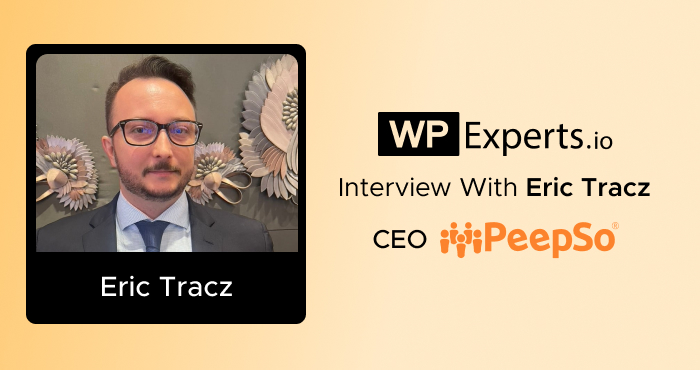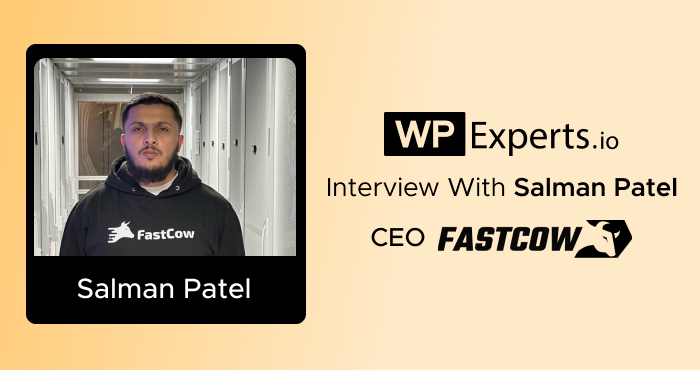Today, we have the pleasure of speaking with Eric Tracz, the Co-Founder and CEO of PeepSo. Eric, a digital nomad currently residing in Manila, The Philippines, has an inspiring journey in the world of open source. He began over a decade ago as a support specialist, first encountering the open-source community through Joomla!
As his career evolved, Eric transitioned to WordPress, where he discovered his true passion and has remained ever since. Join us as we delve into his experiences, insights, and the story behind his inspiring journey in the world of WordPress.
Q1. How long have you been in the WordPress industry?
Oh, that’s a good question. I actually had to double-check, and it seems that I’m pushing for 10 years or so.
Q2. What are your day-to-day responsibilities as a CEO of PeepSo?
In short, I make sure everything runs smoothly. I’m grateful to have my partner Matt, who’s the co-founder and CTO. He takes care of the more technical aspects of everything while I make sure that pretty much everything else is running well.
Q3. How did you get the idea of building the Almighty Support Plugin?
I had to change the question a bit. You’ll get why in a second. It’s not been officially announced yet, but we decided to rebrand Almighty Support to Awedesk. We’ll get to the official announcement in a week or two. We’re still polishing the new website.
But let’s go back to the actual question. Over my entire career in IT, I have been using and working with various customer support software. Being in the position of an employee, you don’t really get to say much about the tools chosen for you, and you have the luxury of not knowing and not caring about the price tag of some of these tools. However, it’s a different story when you’re running the show.
Collectively, we went through most of the big brand names and even smaller ones. We even decided to stop using SaaS solutions like Help Scout and Zendesk because of their price tags. It’s ridiculous that you must pay over $10,000/year (or more) for a team of 10-15 people. We decided to go with a self-hosted solution, one of the popular ones at the time of our switch. Little did we know that literally a month or so after our switch, that software became abandonware.
After about a year, someone else bought it, and the whole experience went south pretty fast. On top of that, we had to spend a considerable amount of our development time ensuring that the solution fit our needs—it was anything but a walk in the park!
It boils down to this: after tens of thousands of dollars and years spent dealing with suboptimal solutions, we were frustrated enough with the whole situation that we decided to create a proper – in our mind – customer contact and support solution. We started selling it only after using it first ourselves for a few weeks. Just so we could firmly say: “It’s good.” Now, we’re working to make it great. We’ll also introduce a SaaS version soon.
Q4. Why do you think building communities on your own website is safer than on popular social media platforms?
It depends on what kind of angle we are looking at. Let’s start with user safety. On global networks, anyone can be anyone; bots are running wild, and you don’t really get to verify users’ identities yourself. You put that trust in a 3rd party service you’re using. The same goes for moderation. The same goes for any kind of abusive content. When you make your own community, you get to decide who to let in. You are in charge of all of the content. You get to moderate any and all content, too. I could go on and on here, but you get the point.
From a business standpoint, it’s dangerous, in my opinion, to have a Facebook group for your product, offer, or service. Let’s say you have a bicycle shop and an online website for it. You sell bicycles, parts, apparel, etc. You create a Facebook group for your clients. You spend all that time getting clients to your website just to send them away to a Facebook group where Facebook will show ads to your clients from your competition. That’s just bad business!
Then there’s privacy. Some communities, by design, need to be private. Some people also don’t want to advertise their particular interests publicly to their friends, family, or coworkers. Being able to find like-minded people to share some of those interests can be very important to some. How many people have lost their jobs because they were ‘exposed’ for their political opinions, sexual preferences, or anything else that might be taboo in their circles?
Q5. Do you think the WordPress plugin industry is becoming more competitive and crowded? What do you do to stay ahead of your competitors?
No. Not really. However, there are some players out there who are buying whole companies and pulling them under their own brand. I’m not afraid of competition. I’m afraid that we might end up with an illusion of choice in the future. It’s a brilliant business move, especially if you have the resources. Still, it’ll be interesting to see what the future holds. As for staying ahead of the competition, we care about our clients; we genuinely care about any and all issues they bring to our attention.
We run tests on our software constantly to ensure we don’t introduce any problems. It’s a series of scripts that automatically click around a site and check whether features do what they’re supposed to. I said that we run tens of thousands of tests for PeepSo, its plugins, and our other software. We have a dedicated server running those tests, and the whole test suite takes about 38 hours to execute them.
Here’s an example:
We have an automated test that checks whether users can create groups when the setting is enabled in the backend. We also have an automated test that checks whether users can’t create groups, if that setting is disabled.
We also have a test to check whether admins can create groups if the setting is enabled and a test to check whether admins can create groups if the setting is disabled.
We do care a lot about the quality of pretty much everything we do.
Q6. You are often seen traveling and biking. How many countries have you visited so far?
A lot. Most of South-East Asia. I rode motorbikes in many of them, too.
Q7. What’s your opinion about the global WordPress community?
It’s mind-blowing. Sometimes, it’s hard to believe how many of us are out there. All are working with the same base yet are able to achieve different goals. So many helpful people out there, too.
Q8. How many WordCamps have you attended? Which one did you like the most?
Less than 20. I have given presentations at three of them. It’s tough to pinpoint just one favorite one. They are different, and each has its own vibe. Especially if you go between WordCamps Asia and Europe. Vienna a few years back was fun. I did enjoy Singapore, too. Kuala Lumpur was great.
Q9. Describe, in three words, what WordPress has given to you.
Life of choice!
Q10. Do you have any suggestions for newbie WordPress business owners?
Don’t do it if you’re not ready to work 24/7, at least for the first few years. And when you think it’s all coming together, and you can relax a little, don’t. Keep at it. If you’re skilled enough, determined enough, and have a little bit of luck, you’ll be fine.
Time To Say Goodbye!
At the end of the interview, we’d like to thank Eric Tracz for spending his precious time with us. It’s time to say ciao until the next interview. Stay connected!


